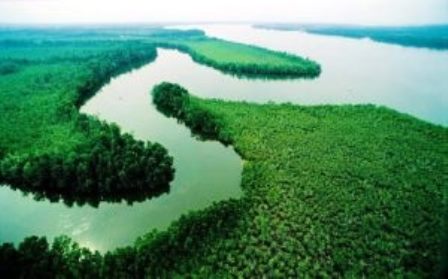Top 10 Importance of River Basins in Nigeria
Areas drained by rivers and their tributaries are known as river basins. Nigeria is home to more than eighty significant rivers, including the Niger and Benue. What significance do these river basins have? River basins are significant because they offer food, drinking water, and habitat for both plants and animals. They also offer hydroelectric power to provide people with the daily electricity they need, river transportation via canals, and erosion management for land where water flows. In Nigeria, there are eleven River Basin Development Authorities. These organizations are in charge of duties like building water supply facilities to give people access to clean drinking water. Let’s talk about the importance of river basins in Nigeria right away.

10 IMPORTANCE OF RIVER BASINS IN NIGERIA
Here are ten significance of river basins in Nigeria today:
PROVISION OF WATER FOR HUMAN USE
Water sources for human consumption have existed in river basins for thousands of years. Coastal communities in Nigeria typically use water from river basins for drinking, cleaning, and watering their animals. In addition to being used for the aforementioned purposes, Nigeria’s communities also depend heavily on underground water for their water supply needs. In large cities, underground water is being used for both home and industrial purposes.
ABILITY TO PROTECT FROM FLOODS
In Nigeria, the ability of river basins to regulate erosion is a crucial function. As a high volume of water runoff from a particular region is gathered and absorbed by the flood plains during periods of heavy rainfall, river basins help prevent floods. This prevents the loss of life and damage to property valued at billions of Naira, serving as a natural way of flood management for coastal towns.
IRRIGATION RESOURCES WITH MASSIVE POTENTIAL TO INCREASE AGRICULTURE OUTPUT
The potential for irrigation in Nigeria’s numerous river basins is enormous. The surface runoff from Nigeria’s major rivers has an irrigation potential of about 3.14 million hectares, according to the River Basin Development Authorities, but only approximately 100,000 hectares are currently used for development. Therefore, regions of land that benefit from the irrigation supplies of the major rivers and their tributaries have continuous agricultural yields that raise the farmer’s income, create jobs, and support the expansion of the national economy.
HYDROELECTRIC POWER PROVISION
The generation of electricity in Nigeria is influenced by river basins. In Nigeria, the dams used to generate electricity are typically built next to a river system’s cascade. The reservoirs at Kainji, Jebba, and I.I.T.A are just a few of the hydroelectric dams in Nigeria. Many of Nigeria’s major rivers have yet to be used for their potential to provide hydroelectric electricity.
GRANTING ACCESS TO RECREATIONAL OPPORTUNITIES
The fact that river basins provide a variety of leisure possibilities for visitors is another benefit of them. When people visit rivers, they might choose to swim, take a canoe ride, or cast a line into the water to catch fish, among other things. On beaches and resorts, which can occasionally be located along river basins, people can engage in a variety of other leisure activities in addition to water sports.
AVAILABLE MEANS OF TRANSPORT
As the second most popular means of transportation in Nigeria, water travel comes in second. In Nigeria, which has more than 80 major rivers, a sizable population relies on rivers for transportation and navigation, particularly in the riverine regions of the nation. Additionally, in many areas of the nation, agricultural products are transported across bodies of water.
SOURCE OF HEALTHY FOOD
River basins provide both people and cattle with a good source of food. Finfish, crustaceans, mollusks, tasty aquatic plants, and algae are among the aquatic delicacies that are extensively gathered from Nigeria’s rivers and other bodies of water. These aquatic foods are nutrient-rich and prevent diseases like cardiovascular disorders. They also contain protein, Omega-3 fatty acids, several minerals, and vitamins. River basins are also advantageous to cattle in a number of ways. For instance, fish oils and fish meal obtained from
SOURCE OF RESOURCES FOR BUILDING AND CONSTRUCTION
White sand and gravel, two essential elements for building and construction projects, have been extracted from river basins. River basins and the areas nearby naturally have white sand. In order to meet the rising demand in the building sector, numerous river basins, including the one in Onitsha along the Niger River, have long been exploited. Nonetheless, the level of exploitation should be determined by the sand budget of each river basin; otherwise, excessive sand mining will have a negative impact on the body of water and the ecosystem.
ACTS AS A HABITAT FOR AQUARIUM ORGANS
Aquatic species like fish, crustaceans, algae, plants, and fauna are widely distributed throughout river basins. These are necessary for those aquatic creatures to survive.
CONCLUSION
Over eighty significant rivers in Nigeria are drained by eight major river basins. The Benue, Delta, and Cross Rivers, the Imo-Anambra, Hadeijia-Chad, Sokoto-Rime, Niger, Owena, and Ogun, and Osun basins are among these river basins. These river basins are essential components of the ecosystem and are necessary for a variety of reasons, including agriculture, transportation, flood control, and human subsistence. This article covered the significance of river basins in Nigeria. We sincerely hope you gained something from reading this article.


